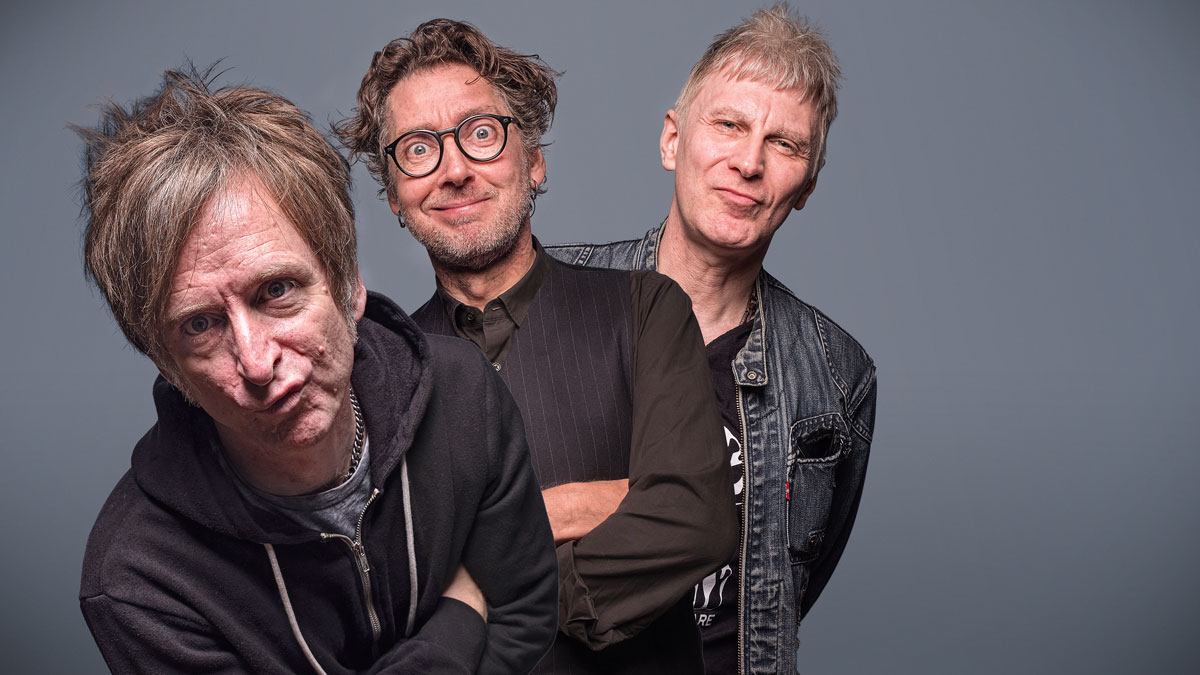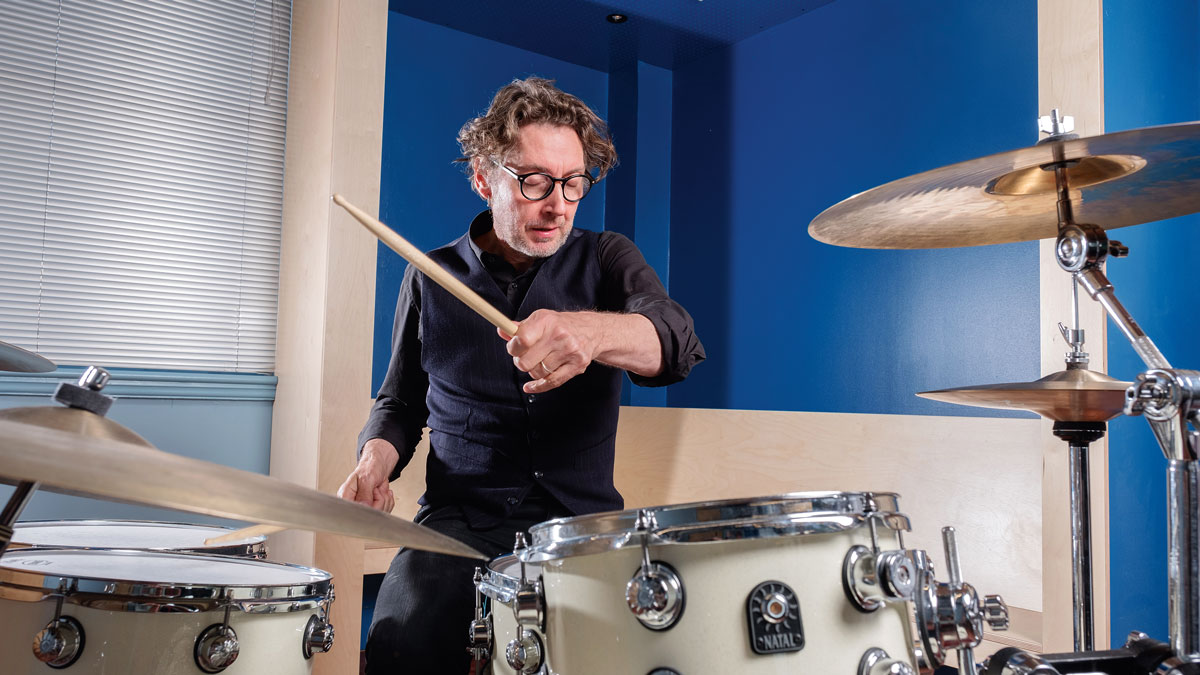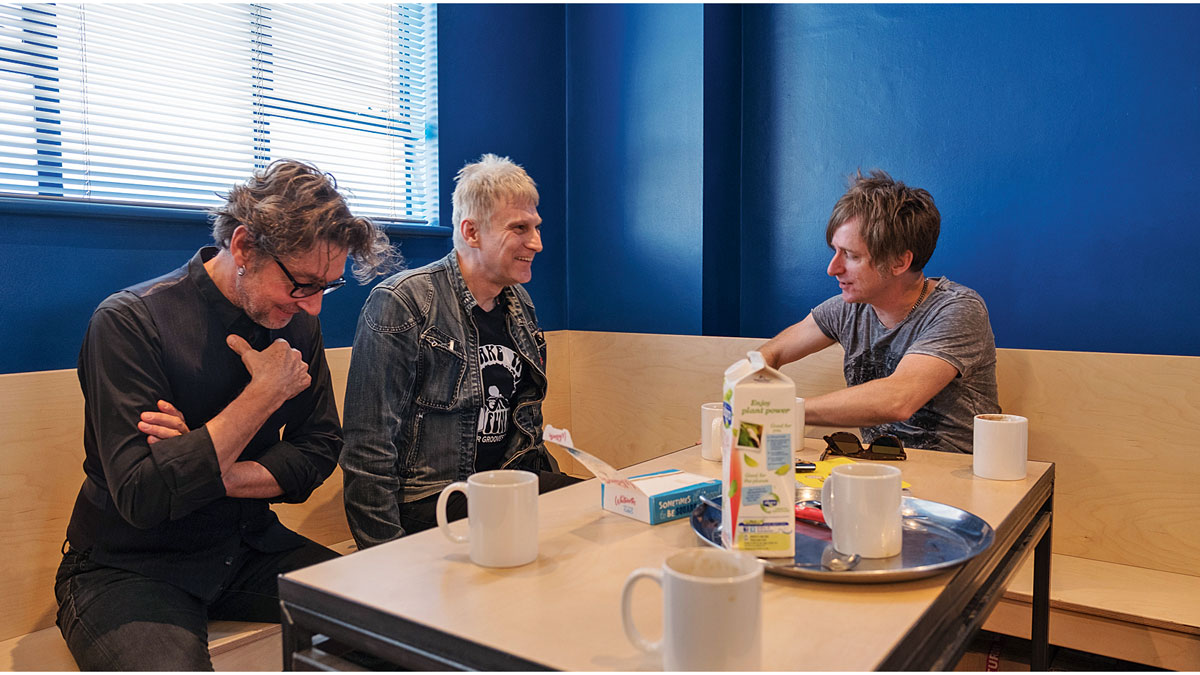
Punk rock fury!
This year has marked the 40th anniversary of the release of the Ramones’ self-titled debut album, the record widely considered to have fired the starting pistol for punk rock.
Punk stripped rock back to basics, three-chord riffs, teenage rebellion, and a thumping backbeat. To figure out what makes a great punk rock drummer, we assembled three of the UK’s finest exponents of the art at BIMM, London, one bright and sunny morning.
On a break from working with John Grant, with whom he recorded 2015’s Grey Tickles, Black Pressure, Budgie has flown in from Berlin for the occasion. Born Peter Edward Clarke, Budgie first attracted attention drumming for The Slits, before joining Siouxsie and the Banshees in 1979.
In 1982 Steve Grantley joined Jake Burns and the Big Wheel, the band formed by the ex-Stiff Little Fingers frontman. In 1997, Grantley joined Burns in the re-formed Stiff Little Fingers and they’ve just released a slamming double live album, Best Served Loud, celebrating 25 years of gigs at Glasgow’s Barrowland Ballroom on St Patrick’s Day.
Danny Farrant has done stints with The Alarm, Spear of Destiny and Grand National, and took over the drum seat for Buzzcocks in 2006.
No intros required
As it turns out, no introductions are necessary – all three know each other and as soon as they sit down, the conversation is off and running.
Steve: “What was your inspiration to play drums?”
Budgie: “I started playing when I was 13 or 14 and I did cabaret bands in the North-West of England. At the weekends we’d go out and as a kid you’d be late for school on Monday morning because you’d been out until 3 o’clock with all the old folk. And you had to be careful about the bingo sessions.
“You did three sets a night – a slow set, a medium-paced set and dance set, faster. It was all the classics, medium-paced pop stuff, and then rock’n’roll which was the fast set. But I wanted to be John Bonham.
But I wanted to be John Bonham...
Budgie
"I’d heard pop songs but that was the first serious rock drumming I’d heard. When two guys knocked on my door and said, ‘You play drums?’ I said, ‘No I don’t. I’m an artist.’ I was at art college, ‘I’m going to be a painter.’
"I was at college, I had turned my back on music, David Bowie was out there having his clothes pulled off, I was into Marc Bolan but I had left it behind for a couple of years and these guys said, ‘We’re playing tonight, we’re supporting Siouxsie and the Banshees.’
“I went, ‘What’s this?’ I’d heard Blondie’s Plastic Letters and The Clash, the first album, but what was also happening was Kraftwerk. There was electronic music coming from Germany and I found that was becoming a bigger influence.
"There was this thing, here comes the drum machine, what’s going to happen to drummers? I’d only just learned how to drum properly, or thought I had, and suddenly all this dance music was coming in. It was threatening but it was also, what could we take from that?”

Does punk rock drumming exist?
Steve: “What about this – does punk rock drumming exist? Is there such a thing as punk rock drumming?
"I don’t think punk drumming actually really exists. John Maher was 16 when he joined the Buzzcocks, he would have been a fledgling drummer so it’s naïve but it’s full of ideas and energy.”
Danny: “It’s a bit surfy. I always thought, where has it come from? And it’s come from surf.”
Budgie: “The Ramones brought it to England. Fast, short.”
Danny: “But if you go back to 1963, The Sonics, there’s no space. If you’re going to do a fill, you can’t do anything that’s broken up or goes across the bars. It’s too fast and really the whole thing about it is, have you got the stamina?
"How were The Sonics doing what they were doing in 1963? That was proper garage rock. That drummer was amazing [Bob Bennett]. His bass drum was so loud.
"People used to say Keith Moon was the first drummer you could hear the bass drum on. The Sonics, every bass drum is like a cannon.”
Steve: “I don’t think punk rock drumming exists. I think there are drummers and they just adapt to what they’ve got to do.”
Budgie: “You just said it, the style of the music doesn’t allow anything else.”

Punk rock masterclass
Steve: “When you’re in the studio now do you try to get takes from start to finish or do you rely on the fact that you can use Pro Tools?
"For our last album, we rehearsed for about a week and a half in LA before we went into the studio because we’re tight and we didn’t want to spend all the money in the studio doing take after take after take.
"So the way we do it, the way I get the band to do it, we go in and everybody has got their headphones on and we play the song. I’m playing to a click, they’re playing to me, we play it once.
"They all went off to the pub and went swimming and then I had a click track and them playing in my cans so I could do take after take after take. After the third take I haven’t got a guitar player going, ‘Oh, not again!’
"Then you feel terrible, you get red light fever. You think, ‘I’ll go for that fill on the end of this one and if you don’t get it, it doesn’t really matter.’ But I was going for takes to try to make it as live as possible. Me and the bass player did the bass and drums in four days, because we’d nailed it in rehearsal.”
Danny: “It just depends on how long you’ve got. I did the drums in a day I think. We did actually do a bit of rehearsal but there’s no money in it, is there? We didn’t have a big budget. It was get in there, do it as quick as you can.
"I’m not really talking about Buzzcocks now but usually you go in the studio, it’s super quick, you’re super tight, there’s no money, you’re not in a big place and you’ve got stuff that can make it sound like you want it to sound later on. I call it ‘reversal’ because what you used to do was three days’ rehearsal and then go in and do it, get it right and you’ve got it right in the front end.
"Now you go in not rehearsing at all, put it down and then spend three days editing it to make it sound like it would have if you’d done three days’ rehearsal. What’s more fun, rehearsing or editing? Editing is a pain in the ass.”
Everybody has got way too busy and there is not enough focus on feel, there’s more focus on pure, raw technique.
Steve
Budgie: “We’re talking about a unit performance, trying to get the feel of a song, rehearsing beforehand, and crafting a song. At Motown they were basically moving the desks out of the way and doing it after the office folks had gone home.
"So these guys had to be really hot. We have to get this done tonight, so it’s got to be quick, you’ve got to be accurate. The process is very, very fast. Over the prog rock years, we gave ourselves more time.
"Punk rock came along and said, ‘We don’t have any money, we do this ourselves, it’s on a shoestring, we go in the studio tonight and bang out an album’, which is what they were doing. I like it when technology gets low-fi’d – grimy and gritty.”
Steve: “I think something that’s happened in the last 10 years, everybody has got way too busy and there is not enough focus on feel, there’s more focus on pure, raw technique.”
Budgie: “What’s the song about? What are the lyrics? I used to have lyrics taped to my bass drum or my cymbal so I knew what the singer was up to. What I’d remember was vocal cues.”
Steve: “It’s like John Bonham almost being punctuation to Robert Plant. You can bring musicality rather than just technical ability.”
Budgie: “I was feeling inadequate for the longest time because I didn’t have that technical prowess. But I was thinking, well, I’m still here so there must be some reason, but I always used to watch the singer. It was vocalists that I kept close with. Everybody has got to be there when they land.”
Danny: “That is so true, even if they’re wrong, which is something you learn. You make a call. A lot of this goes on in our band. I know which side of the coin I come down on – I go with the singer.
"If the singer is doing his thing and can’t hear you because he’s communicating with the audience, but I know he’s gone out by two beats or a beat, I come back in with him. To me, that’s being a trustworthy person. You’re on his side and you’ve got his back. But you learn that.”
I always used to watch the singer. It was vocalists that I kept close with. Everybody has got to be there when they land.
Steve: “I started off, my drum teacher got me a gig with Thames television’s big band, the rehearsal band that would rehearse singers that were coming in, then Ronnie Verrell or someone would come in and do the big gig.
"Then we’d go out and do live shows and that’s where I started working, I was working with guys who were twice my age. They gave me a music stand with all the music, I didn’t know how to set the music stand up.
"Then I got the music out and it was way, way above me. My drum teacher put me in way over my head. All the arrangements were by Tommy Dorsey and my dad had all the Tommy Dorsey records, so they thought I was a brilliant reader and I was playing by ear. I was playing that jazzy stuff but listening to punk rock.”
Danny: “My old man used to play big band stuff all the time. He can’t stand punk rock. I suppose it was to stick two fingers up to the old man to put Siouxsie and the Banshees on.”
Budgie: “I loved XTC.”
Steve: “Me too! I was just thinking of that myself. Terry Chambers was brilliant, wasn’t he?”
Budgie: “His son is playing now. He says his son is a better player than him. He lives in Australia apparently. Making Plans For Nigel, a wonderful drum beat and it’s still the one that is his signature beat. You come up with something that’s yours, your way of doing something. And he had massive toms, big drums.”
Steve: “Is that where you got it from or had you already started doing that?”
Budgie: “No, I was watching him. I was quite a novice drummer then. XTC arrived in Liverpool, we had Eric’s club in Liverpool and so we got the first visitation of The Clash and XTC, The Ramones, Talking Heads, and Blondie with Clem Burke.
"All this stuff was filtering in. And Kraftwerk. My old Gretsch kit was 14", 15" and 18" [toms], strange sizes. I was tuning it up and tuning it down, reading about how Bonham tuned his kit. I had techs coming up to me saying, ‘Use smaller sizes because they cut through more,’ which sort of makes sense but they didn’t sound very good to me.”

Iggy and the Pistols
Danny: “Did you see Iggy Pop’s BBC6 lecture? It was amazing. You think Iggy’s so cool, he’s going to dis everything, but he didn’t at all.
"He’s so open about getting knowledge – if you want to read music, do it, it might just help an element of your musicality.Go and get as much knowledge from as many genres. It was like, thank god somebody is saying this. At nine years old I learned every Paul Cook lick.”
Budgie: “Paul got me my gig with the Banshees. He shared an apartment with the Banshees’ manager.”
Steve: “I think Paul is a good drummer and the Pistols go against the thing of punk rock being fast. The Pistols stuff was mid-tempo, it was powerful but it wasn’t fast and frenetic.
"You could say Paul Cook is not a punk rock drummer because he’s not playing everything at frenetic speed, he had control and power. People think of punk rock drummers as being fast.
"You listen to some American punk rock which they play really, really fast because they think that’s what punk rock is all about. It’s not.”
Budgie: “It certainly changed my thinking because this was attainable where somehow Bonham was in another league. When I heard the Pistols I recognised that too.
"I did a little band with Glen Matlock, Danny Kustow from the Tom Robinson Band, Steve New from Rich Kids. Glen had his own songs and he wanted to get a band together so he had this scratch band for about six shows called the Jimmy Norton Explosion. Did a Peel session.
"I was playing with Glen and I’d never played with a bass player that did this before, he played like he was playing rubber band strings. Nothing was precise, everything was moving around. I thought, where do I land? It was a quick learning curve. It’s not always the same, it’s not always eighths.”
I never worry about the bass player. He follows me, I don't follow him.
Steve: “I never worry about the bass player. He follows me, I don’t follow him. Really, that’s how I feel about it. I don’t have the bass player in my monitor.
"I have the guitar player – that’s where a lot of the riffs come from that are my cues, I need the vocals because I need to punctuate off the vocals to know where we are but, as long as I can hear a little rumble, I don’t need to lock in with the bass. I have to be the roadmap.
"I’ll follow the singer if he cuts out a verse or a chorus, but bass player, you follow me. That’s where the ‘1’ is, where my bass drum is.”
Danny: “You learn what gets you through. Every stage is different. Sometimes the bass can bugger everything up, regardless of the player.
"If the subs are under the stage and they just create a wodge of noise, at those points what do you do? You just go on to, I know what I’m doing, I’m sticking to it, it’s got nothing to do with anyone else. You just do your job.”
Steve: “You do have to listen to them but as for locking in with the bass player, lock in with me because if you follow me, we’ll be alright.”